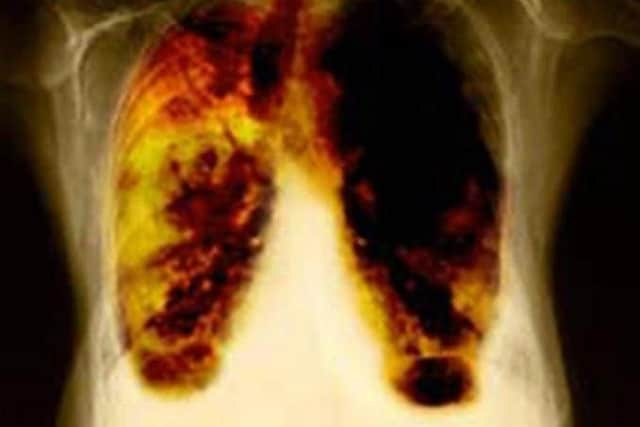NHS Scotland approves new lung cancer treatment
Doctors and campaigners welcomed the decision by the Scottish Medicines Consortium to allow the drug Keytruda, also known as pembrolizumab, to be used along with chemotherapy to treat people with an advanced stage of the most common form of lung cancer.A total of 5,331 Scots, 2,592 men and 2,739 women, were diagnosed with the disease in 2017, with the disease representing about a sixth (16.5%) of all cancers diagnosed that year.
But just less than a 10th (9.8%) of patients are still alive five years after diagnosis.
Advertisement
Hide AdAdvertisement
Hide AdThe SMC's decision means that patients with metastatic non-small cell lung cancer (NSCLC), which about 90% of sufferers have, can now benefit from the immunotherapy treatment, as well as chemotherapy.


Paula Chadwick, chief executive of the Roy Castle Lung Cancer Foundation, described it as a "huge step forward" which offers patients "another way to live well with lung cancer for longer".
She said: "We are delighted by the SMC's decision.
"It means that now more patients with NSCLC can access this beneficial treatment option."
Ms Chadwick added: "Scotland has had one of the highest rates of lung cancer in the world and approximately nine out of 10 patients with lung cancer have NSCLC.
"New treatment options like this are having a huge impact on people's lives.
"They are keeping families together for longer and we will continue to campaign for more access to these life-lengthening treatments."
Dr Brian Clark, consultant clinical oncologist at the Beatson West of Scotland Cancer Centre, also hailed the decision as "very welcome news for lung cancer patients in Scotland".
He said: "While single-agent immunotherapy has been helping Scottish patients for several years, it is clear that many patients benefit from the combination of chemotherapy and immunotherapy given together. "
Improving existing treatments
Advertisement
Hide AdAdvertisement
Hide AdDr Clark said a similar combination of treatment was already available for patients with a different form of the disease, adding: "We now have the exciting opportunity to offer immunotherapy in combination with chemotherapy to certain patients with non-squamous NSCLC too".
He stated: "This is an important development in the treatment of lung cancer in Scotland, where lung cancer remains the leading cause of cancer death in both men and women."
John McNeill, devolved nations director at drug manufacturer MSD, said: "We are pleased that after a review of additional evidence the SMC has recognised the value of pembrolizumab in combination with chemotherapy as a treatment option for certain patients with non-squamous NSCLC in Scotland.
"MSD has worked collaboratively with the SMC and NHS Scotland to secure access for another subset of patients with advanced lung cancer to a treatment option which has the potential to increase survival.
"This new acceptance broadens access to include all eligible patients with NSCLC, bringing immunotherapy treatment to many more people in need."
The SMC also approved Yescarta, also known as Axicabtagene ciloleucel, for treating blood cancer lymphoma, Decapeptyl SR, Triptorelin acetate, for early stage breast cancer and Skyrizi, also known as risankizumab, for severe psoriasis.
The consortium turned down the use of Perjeta, pertuzumab, for the treatment of early stage breast cancer and Xtandi, enzalutamide, for early stage prostate cancer, citing a weakness in the of evidence of the benefits of these treatments.
